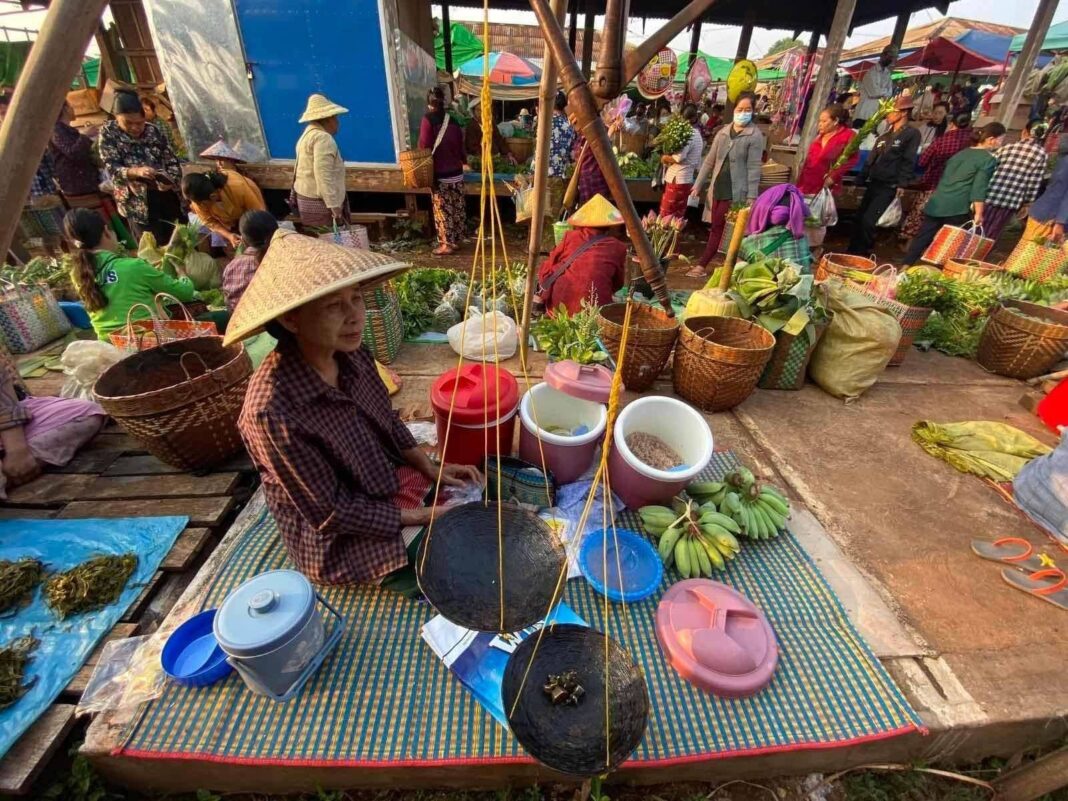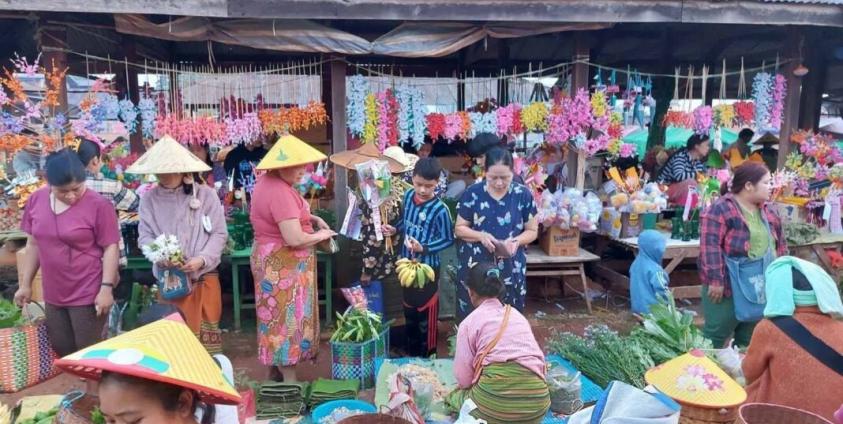Sai Harn Lin— Early in the morning, Nang Kham Leng heads to the market with her shopping basket, pondering the essential food items she needs. Living with her 70-year-old mother, she realizes the nutrient supplement is running low and adds it to her shopping list.
At the grocery store, she inquires about the price of Ensure milk powder. The shop owner responds, “65,000 (sixty-five thousand) kyats per can.”
Nang Kham Leng is shocked at the price of Ensure supplement powder. Just a few months ago, she bought a can for only 53,000 kyats (fifty three thousand kyats), but this month the price has jumped by more than 10,000 kyats, so she had to walk out of the store with a sad face.
“My mother’s powdered milk used to cost just 53,000 kyats. Currently, it is about 65,000 kyats. I’ve had to stop buying it due to the price increase, and it’s been more than three to four months since I’ve been unable to give my mother Ensure Milk”, says a discouraged Nang Kham Leng.
Nang Kham Leng resides in the border town of Muse, situated on the China-Myanmar border in Shan State. However, life in this town has become increasingly challenging due to the fluctuating value of the Chinese currency.
“Whenever the price of Chinese currency rises, the cost of goods also surges. Particularly for commodities from Thailand, as they undergo multiple levels of transportation to reach our location. As a result, their prices increase even more. It seems like almost every day, the prices of goods keep rising,” shares Nang Kham Leng, describing the difficult situation being faced.
In the bordering Chinese city of Muse, the cost of one hundred Chinese yuan increased from 41,800 kyats to 42,300 kyats at the beginning of June, then from 43,000 kyats to almost 45,000 kyats in the third week.
Nang Kham Leng stated that the cost of food products have been rising consistently along with the price of the Chinese yuan and consumer goods.
“The price of a 3-Viss can of cooking oil has reached 25,000 kyats,” exclaimed Nang Kham Leng. “Cooking oil would also decline in value if the Chinese Yuan’s value dropped, and vice versa.”
 Before the Covid-19 outbreak, Nang Kham Leng and her mother were vendors, selling fresh commodities, in the market of Muse town, which is located on the border with China.
Before the Covid-19 outbreak, Nang Kham Leng and her mother were vendors, selling fresh commodities, in the market of Muse town, which is located on the border with China.
Nang Kham Leng shared that since the Covid-19 outbreak spread, the fresh market in Muse was forced to close down. As a result, the market has been relocated to different areas, posing a significant challenge for her family to rent a place to continue their vending business.
“In the new location, we have to rent a space from the residents there, which costs around 40,000 to 50,000 MMK per month. Additionally, we have to pay the municipality 4,000 MMK monthly,” explained Nang Kham Leng. “Unfortunately, the rental costs have made it impossible for us to resume our fresh commodities selling activity.”
Nang Kham Leng expressed her dismay at being unable to sell their fresh goods as they did before due to the inability to afford renting a space in the new market location. As a result, for the past one year, they have had to adjust to selling fresh produce, like spring onions from their own garden, and delivering them upon receiving orders.
Myanmar’s economy has been impacted by the aftermath of the military coup and the ongoing economic instability, with rising prices of gold, dollars, and Chinese yuan adding further pressure on the value of the Myanmar Kyats.
Previously, a 3-Viss bottle of cooking oil ranged from 10,000 to 15,000 MMK. However, due to the rise in the price of the Chinese yuan, it has surged to as high as 25,000 MMK per bottle.
Similarly, a patch of 30 eggs used to cost between 3,000 to 4,000 kyats before, but now it has increased to a price range of 7,000 to 8,000 kyats. This substantial price hike has put families in a difficult position, making them rethink their purchases.
“When I saw that the prices were rising, one thing I thought in my mind was, why are the prices rising so much, and what would continue to happen to our country, Myanmar,” Nang Kham Leng said, while sighing several times.
 Currently, each Viss earns about 6,000 kyats from the spring onions her family sells. They feel the need to raise the price as a result of the rise in commodity prices. However, they worry that nobody would purchase at the higher price.
Currently, each Viss earns about 6,000 kyats from the spring onions her family sells. They feel the need to raise the price as a result of the rise in commodity prices. However, they worry that nobody would purchase at the higher price.
Nang Kham Leng sadly expressed, “There is no regular demand for our fresh vegetables. Sales mostly happen during social events like religious ceremonies or weddings in the ward. Some people occasionally make small purchases at home, but it’s not a daily occurrence; it only happens when there’s irregular demand. Since our goods are fresh, we can’t really raise the price too much, as people would hesitate to buy if it becomes too expensive.”
Nang Kham Leng, a housewife who depends on selling spring onions from her home garden, is facing even greater struggles as the prices have doubled.
Similarly, other housewives like Nang Kham Leng, who must cook daily for their families, are also experiencing similar difficulties. With the rising prices, they have to be extremely cautious about their spending “In the past, commodity prices used to be fair. One purchase of any fresh food or meat would allow you to prepare 4-5 dishes of meals. However, now you can barely make 2 dishes out of one purchase. We have to be very careful and reduce our purchases and consumption,” said Nang A Ti.
To make a living, Nang Aay Ti’s family engages in agricultural activities as one source of income. Additionally, they are involved in merchandise activities in Muse, a border town with China, to supplement their earnings.
Since the outbreak of the Covid-19 disease, compounded by the impacts of the military coup, China’s border trade has been severely affected and unable to operate normally. Restrictions on imports have resulted in significant damage to their economy and source of income.
“In the past, our family used to enjoy eating out, having snacks, and having barbecues. However, due to the current situation, we are no longer able to afford such luxuries. Every purchase requires careful reconsideration, and we have to prioritize what is most essential. Now, we prioritize spending on our children’s education over eating out,” said Nang A Ti.
Because of the current political instability, the economy is facing difficulties, making life challenging for many. In times of crisis, people focus on their basic needs, like food, rather than wants. They have to carefully think about what’s essential and important.
The income generated from their agricultural and merchandise activities is not enough to fully support their two children, both above 10 years old, with one attending primary school and the other enrolled in high school. To earn more, Nang A Ti’s husband has taken part-time work, transporting sands and stones with a truck.
“Now that the prices of everything are increasing, we find ourselves working even harder. We have to put in more effort and struggle compared to before. After finishing our farming activities, sometimes my husband has to take up transporting sand and stones,” said Nang A Ti.
She continued, explaining that due to the current state of the education system, they have decided to enroll their children in schools run by private entities. However, their family has to spend at least 50 lakhs per year on school fees and expenses.
The increased expenses have added to their struggle, and there are days when they feel exhausted and complain about the challenges they face. However, Nang A Ti also acknowledges that during these difficult times, many others are going through similar circumstances and struggles. This realization helps them find comfort and strength in knowing that they are not alone in their difficulties.
“In this time of difficulties, we know that everyone is facing similar challenges. However, when we compare ourselves to many others, we are still managing to survive. We have food to eat and work to do, and this is how we find comfort,” says Nang A Ti.
The situation is tough for ordinary people, and many are working extremely hard just to have three meals a day. However, since the military coup two years ago and the subsequent sharp increase in commodity prices, people are struggling even to have two meals a day.
Amidst these challenging circumstances, with the cost of goods rising daily, there is a surprising and alarming situation in Shan State. The price of narcotic drugs or methamphetamine is unbelievably low, at only 200 kyats (approximately 0.095 USD) per tablet. It is even cheaper than an egg, and this has become a significant social and economic threat to families.
Amidst the economic fluctuations and the current political situation, finding work and sustaining a living has become increasingly challenging. This has led to worries and frustration as Nang Kham Leng faces uncertainties about her financial stability and future prospects.
Nang Kham Leng feels a duty to care for her elderly mother because she is a daughter, but she is struggling financially and cannot afford to buy her nutritional supplements. Living with her mother, she must be careful with her spending and prioritize saving for her mother’s healthcare.
“I can’t provide enough for my mother, and it makes me feel irresponsible,” Nang Kham Leng said weakly. “However, I cannot collapse. I have to keep struggling for my mother’s sake.”







